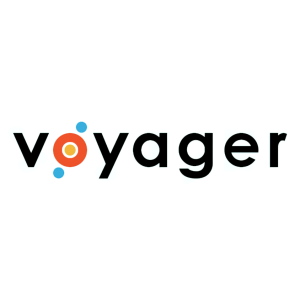Voyager Therapeutics Presents Positive Preclinical Data Supporting CNS-Directed GBA1 Gene Therapy at Virtual Congress of the European Society of Gene and Cell Therapy
Rhea-AI Summary
Voyager Therapeutics (Nasdaq: VYGR) announced promising preclinical data on its GBA1 gene replacement therapy, showing sustained correction of GCase enzyme activity across multiple brain regions in mice after a single intravenous dose. Results from the virtual Congress of the European Society of Gene and Cell Therapy indicated a 300% to 660% increase in GCase levels, potentially enabling effective treatment for neurological diseases like Gaucher disease and Parkinson’s. The therapy was well-tolerated, showcasing the advantages of blood-brain barrier-penetrant AAV capsids over traditional delivery methods.
Positive
- Single IV dose of GBA1 gene therapy achieved a 300% - 660% increase in GCase levels.
- Demonstrated widespread CNS distribution and sustained correction of GCase activity.
- Well tolerated across all doses in preclinical mouse models.
Negative
- None.
News Market Reaction
On the day this news was published, VYGR declined 7.19%, reflecting a notable negative market reaction.
Data tracked by StockTitan Argus on the day of publication.
Single AAV intravenous dose achieved widespread CNS distribution and sustained correction of GCase activity in multiple brain regions
CAMBRIDGE, Mass., Oct. 20, 2021 (GLOBE NEWSWIRE) -- Voyager Therapeutics, Inc. (Nasdaq: VYGR), a gene therapy company developing life-changing treatments and next-generation adeno-associated virus (AAV) platform technologies, today announced the presentation of preclinical data demonstrating a single intravenous (IV) dose of its novel GBA1 gene replacement therapy achieved widespread distribution in the central nervous system (CNS) and peripheral tissues of mice, and substantially raised levels of the GCase enzyme in both in vivo and in vitro models. The results are available in an on-demand poster session throughout the virtual Congress of the European Society of Gene and Cell Therapy (ESGCT) Oct. 19-22.
“These encouraging preclinical results demonstrate that a single IV dose of GBA1 transgenes transported by a blood-brain barrier penetrant AAV capsid can effectively deliver therapeutically relevant levels of GBA1 protein to multiple brain regions of mice. Notably, the increase over endogenous GCase levels in the range of
Data presented at ESGCT demonstrates that AAV gene transfer of GBA1 transgenes in the cells of mouse models significantly reduced GCase enzyme activity and the accumulation of glycosphingolipids compared to non-AAV delivery. The treatment was well tolerated at all doses and resulted in the safe delivery of therapeutically relevant levels of GBA1 protein to multiple brain regions in mice. Key findings included:
- AAV vector optimized GBA1 achieved widespread distribution and sustained correction of GCase activity after IV administration in WT mice.
- Consistent voltage gated (VG) distribution and GCase activity was observed across the CNS following IV delivery.
- IV administration of BBB-penetrant capsid optimized GBA1 transgenes at a high dose resulted in approximately a
300% –660% increase over endogenous GCase levels, suggesting the potential for dose reductions given that increased GCase activity of30% -50% is anticipated to be clinically impactful. - Results validate GBA1 transgene-level DRG tissue-detargeting approach in vitro.
About GBA1 Mutations
The GBA1 gene encodes the lysosomal enzyme β-glucocerebrosidase (GCase) and GBA1 loss of function results in GCase deficit and cellular build-up of glycosphingolipid-substrate. In patients with GBA1 mutations, decreased levels of GCase can result in accumulations of lipids in the body, driving a number of diseases include Gaucher disease, Parkinson’s disease, and Lewy body dementia. While enzyme replacement therapies can have clinical impact, they fail to adequately cross the blood-brain barrier to address disease in the CNS.
About Voyager Therapeutics
Voyager Therapeutics (Nasdaq: VYGR) is leading the next generation of AAV gene therapy to unlock the potential of the technology to treat devastating diseases. Proprietary capsids born from the Company’s TRACER screening platform are powering a rich early-stage pipeline of new and second-generation programs and may elevate the field to overcome the limitations of conventional gene therapy vectors across neurologic disorders and other therapeutic areas.
voyagertherapeutics.com LinkedIn Twitter
Forward-Looking Statements
This press release contains forward-looking statements for the purposes of the safe harbor provisions under The Private Securities Litigation Reform Act of 1995 and other federal securities laws. The use of words such as “may,” “might,” “will,” “would,” “should,” “expect,” “plan,” “anticipate,” “believe,” “estimate,” “undoubtedly,” “project,” “intend,” “future,” “potential,” or “continue,” and other similar expressions are intended to identify forward-looking statements.
For example, all statements Voyager makes regarding the positive nature of the preclinical data presented at the Annual Congress of the European Society of Gene & Cell Therapy (ESGCT); the ability of a single intravenous (IV) dose of novel GBA1- gene replacement therapy to achieve widespread distribution in the central nervous system (CNS) and peripheral tissues of wild type (WT) mice; the potential that blood-brain barrier penetrant capsids may have to address severe neurological diseases; the ability of intravenously-administered gene replacement therapy to substantially raise levels of the GCase enzyme in both in vivo and in vitro mice models, the validation of GBA1 transgene-level DRG tissue-detargeting approach in vitro; and the potential for such preclinical data to support the potential of a novel therapeutic approach for Gaucher disease, Parkinson’s disease and Lewy body dementia are forward looking.
All forward-looking statements are based on estimates and assumptions by Voyager’s management that, although Voyager believes such forward-looking statements to be reasonable, are inherently uncertain. All forward-looking statements are subject to risks and uncertainties that may cause actual results to differ materially from those that Voyager expected. Such risks and uncertainties include, among others,; the continued development of various technology platforms, including Voyager’s TRACER platform; Voyager’s scientific approach and general development progress, including in particular with respect to the GBA1 program; the ability to develop, manufacture and optimize capsids that effectively deliver relevant levels of GBA1 protein to multiple brain regions the ability to attract and retain talented contractors and employees; the ability to create and protect intellectual property; the sufficiency of cash resources; These statements are also subject to a number of material risks and uncertainties that are described in Voyager’s most recent Annual Report on Form 10-K filed with the Securities and Exchange Commission, as updated by its subsequent filings with the Securities and Exchange Commission. All information in the press release is as of the date of this press release, and any forward-looking statement speaks only as of the date on which it was made. Voyager undertakes no obligation to publicly update or revise this information or any forward-looking statement, whether as a result of new information, future events or otherwise, except as required by law.
Voyager Contacts
Investors
Investors@voyagertherapeutics.com
Media
Scott Santiamo
ssantiamo@vygr.com








